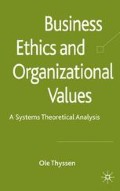Abstract
Ethics in organizations concerns the relationship of organizations to the parties that influence or are influenced by their decisions. We refer to any ‘party’ who has an interest as a stakeholder.1 It provides a service and expects a reward. It is often a relationship between service and money,2 but other relationships are possible as well. Concerning oneself with the stakeholders of an organization is not the same as concerning oneself with the premises for its decision. There is, however, a clear connection between stakeholders and premises. Stakeholders put pressure on the organization to undertake specific concerns, that is, to base its decisions on specific premises. In the counter-pressure between many different stakeholders, an organization has to decide which decisions it considers acceptable or unacceptable. It has to decide who is going to benefit from its actions and hence who will suffer from them, or at least not prosper.3
Access this chapter
Tax calculation will be finalised at checkout
Purchases are for personal use only
Preview
Unable to display preview. Download preview PDF.
Notes
On the history of the stakeholder concept, see R. Edward Freeman, Strategic Management: A Stakeholder Approach, Boston, 1984, Chap. 2.
See R. Edward Freeman and Daniel R. Gilbert, Corporate Strategy and the Search for Ethics, Englewood Cliffs, NJ, 1988, p. 7, who argue that any strategy entails ethics, perceived as an articulated or tacit assertion of the values that carry the greatest weight in a situation of conflict.
Niklas Luhmann, Social Systems, Stanford, 1995, p. 477: ‘Evolution is all that is needed for survival.’
A different and simpler model can be found in Ackoff, Creating the Corporate Future, p. 31. A third model can be found in Henry Mintzberg, Power in and Around Organizations, Englewood Cliffs, NJ, 1983.
See e.g. W.R. Scott, Organizations: Rational, Natural and Open Systems, Englewood Cliffs, NJ, 1981.
Fundamental assumptions constitute a paradigm within which decisions are made but which does not in itself become the object of a decision. Since values are not objectively given, it means that they are decided without being decided. They cannot be proven but unfolded and asserted. On such assumptions, see Edgar H. Schein, Organizational Culture and Leadership, New York, 1996, p. 95. They pertain to humans’ relations to nature, mankind, the perception of reality, time and space, and right and wrong. One cannot get ‘behind’ one’s fundamental assumptions, since there are no available means to do this with. However, they can become the subject of reflection. When they clash with other assumptions of the same calibre, it becomes apparent that they are local assumptions no matter how general they perceive themselves to be. They have come into being and can be changed. They have no strict logic of evidence. Thus it is misleading for Schein to assert that fundamental assumptions cannot be regulated because they form the basis of regulation (p. 325).
An analysis of the failure of both tactual and normative strategies in relation to value conflicts can be found in Niklas Luhmann, ‘Risiko und Gelahr’, in Soziologische Aufklärung 5, Opladen, 1990.
See John Kenneth Galbraith, The New Industrial State, London, 1967, pp. 86ff., where the claim is that, because of their larger number and lack of knowledge, owners are not able to exercise ellective power in the organization.
Søren Kierkegaard, ‘Judge lor Yourself’, in For Self-Examination: Judge for Yourself Princeton, NJ, 1990, pp. 123f.
See James A.F.R. Stoner, Edward Freeman and Daniel R. Gilbert, Management, Englewood Cliffs, NJ, 1995, pp. 468ff.
See Richard Rorty, Contingency, Irony, and Solidarity, Cambridge, Mass., 1989, p. 60. In the same way he argues that truth does not need a guarantor: ‘If we take care of freedom, freedom can take care of itself’ (p. 176).
John Rawls, A Theory of Justice, Cambridge, Mass., 1971.
See C.B. Macpherson, The Political Theory of Possessive Individualism: Hobbes to Locke, Oxford, 1962. The theme of the book is the change of the semantics in relation to goals and motives which took place in the shift from feudalism to modern times. In Adam Smith, The Wealth of Nations, and in the early liberalism the shift has already happened and the economic market is populated with individuals who do not rely on solidarity or goodwill, only on egoism. In economic terms it is mercantilism that carries out the change in language, the legitimization of new motives, etc.
See the criticism of neo-classical economy in Herman Daly and John Cobb, For the Common Good, Boston, 1991, Chaps 2 and 4.
Author information
Authors and Affiliations
Copyright information
© 2009 Ole Thyssen
About this chapter
Cite this chapter
Thyssen, O. (2009). Values and Stakeholders. In: Business Ethics and Organizational Values. Palgrave Macmillan, London. https://doi.org/10.1057/9780230250932_9
Download citation
DOI: https://doi.org/10.1057/9780230250932_9
Publisher Name: Palgrave Macmillan, London
Print ISBN: 978-1-349-31137-8
Online ISBN: 978-0-230-25093-2
eBook Packages: Palgrave Business & Management CollectionBusiness and Management (R0)

